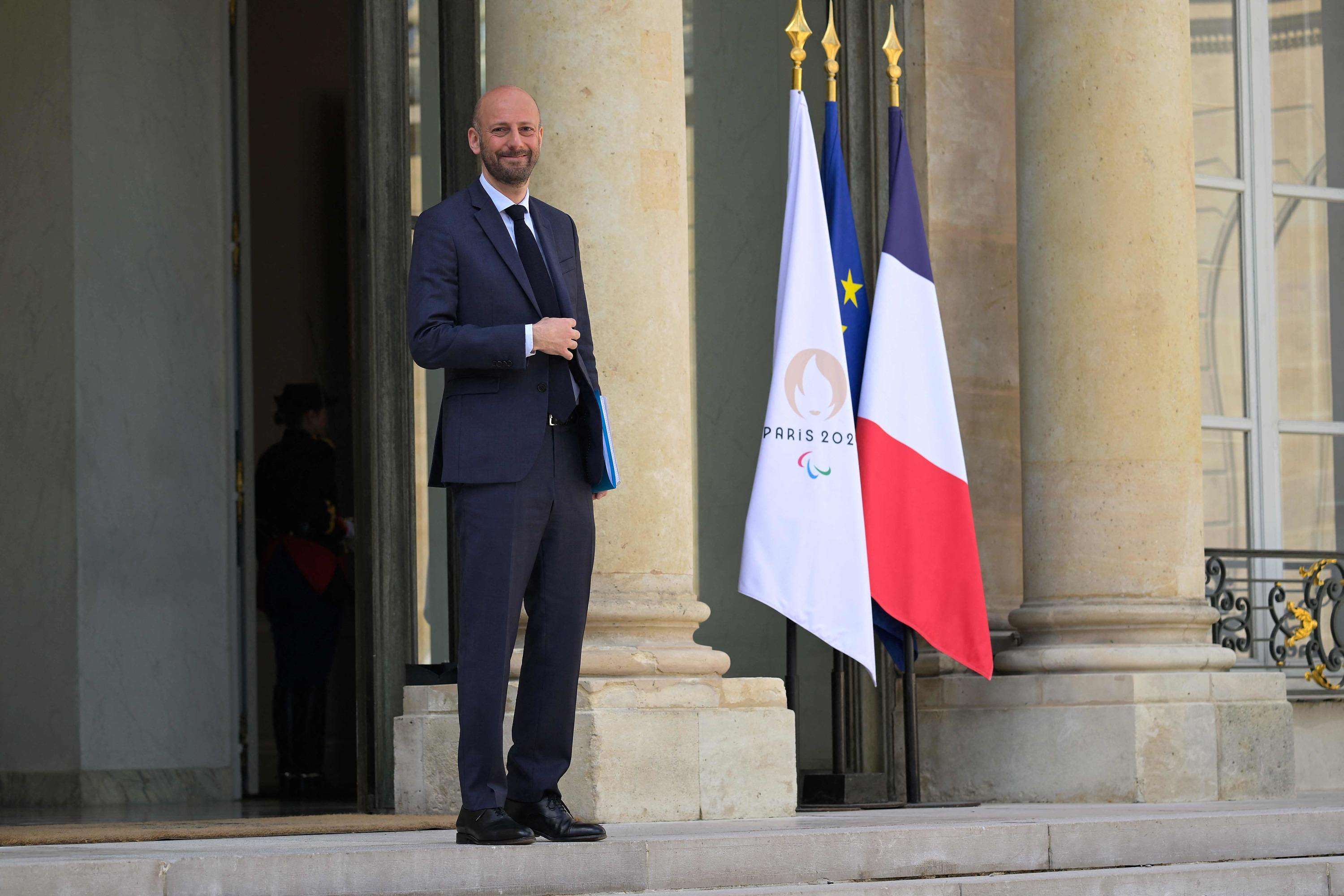WORLD: Monsieur Berger, the mood in France is explosive, the President is stubborn. Can you explain to us how these hardened fronts came about?
Laurent Berger: The trigger is a pension reform in a country that has not always, but often had problems with pension reforms. But what is expressed above all in these protests is the desire for recognition and respect for the work. The President hasn't realized that we've just come out of a pandemic. It has changed work and shaken up the relationship to work. Especially for those workers who continued to work during the lockdowns, primarily in healthcare, nursing, the food industry, waste management and sales, there was no recognition of their commitment through salary increases. On the contrary. They are now the target group of pension reform. The conflict may have started over pensions, but it is turning into a democratic crisis.
WORLD: What does that mean?
Berger: That social protests have become political. Outrage and anger grow. France is not on fire, as is sometimes suggested, even if there are brutal pictures and we fear riots. Above all, we note that this is the largest social movement since the 1980s, with record participation in three days of action in a country where demonstrations are not uncommon. After ten days of strikes, 94 percent of the active population reject the reform, 70 percent of the general population. So the support is unbroken.
WORLD: What could a solution to this stalemate look like?
Berger: After the implementation of Article 49.3 of the Constitution ten days ago, the emergency exit is no longer in sight. Since then, more and more young people have joined the protests. I see only one way out: Macron has to press the pause button, temporarily suspend the law and seek dialogue. We have to sit down for two or three months with mediators and representatives from business, politics and trade unions and negotiate a social compromise.
WORLD: Why was there no social dialogue in advance?
Berger: There is a lot to be said about what could have been done to avoid ending up in this impasse. The fact is that the government was not looking for a social, but a political compromise with the French conservatives, which obviously went wrong.
WORLD: You supported Macron's first attempt at reform, not the second. When did Macron lose you?
Berger: Macron wanted to make a systemic reform in his first term. He said at the time that raising the standard retirement age was out of the question when the proportion of active seniors in France was so low and the strain on some jobs so heavy. But politics forces contortions. With a left in bad shape, Macron has sided with the right-wing camp, proposing an age limit of 65, like the Conservatives during the presidential campaign. He wanted to assure himself of their votes.
WORLD: Which seals the end of his political maxim "both right and left" when it's not about content, but only about political maneuvers....
Berger: There were opportunities before to seal this end. When it comes to issues of distribution, taxation, and labor, some things are just incompatible. Not only has Macron changed his mind, he has also decided to rule in a completely vertical way. In my view, this is a form of populism light: it ignores the social partners unintentionally or quite consciously. In his book "Revolution" he described them as "government evaders". He wants nothing to stand between him and the people. That characterizes populism. But the social partners translate the voice of the citizen who needs to be listened to. And they don't want this reform.
WORLD: Accepting the break would be a concession from Macron. How would you meet him in return? Are you ready to talk about the age limit of 64? In the past you yourself have argued for longer working lives.
Berger: They are automatically extended by increasing the deposit period. Since 2003, the number of years a government employee must pay up has increased from 37.5 to 43 years. It is simply wrong to say that no effort has been made. We have always said clearly: the age limit is the most stupid of all criteria, it is unfair and impractical, because a system of redistribution is about how many years I owe society. Now they want to create a system where everyone retires at the same age, which is actually not the case.
WORLD: But the other Europeans have already bowed to this compulsion and raised the age limit. From the German point of view, the resistance is incomprehensible.
Berger: If you compare France, please use the only valid criterion: the effective retirement age. It's always pretended that the French all retire at 62. The fact that there are two age limits in France is not taken into account: you can apply for your pension from 62, but you may have to work until 67 to receive a pension without deductions. Especially in my generation, which was confronted with high unemployment, professional careers are riddled with holes. Therefore, the effective retirement age is over 63 years. The experts predict that it will continue to increase. If you look at countries like Germany, the age limit may be higher, but the effective retirement age is not that far removed from France. I'm only interested in the facts. And if you're already comparing, please do it right: In this country, not once has a government suggested that I build up a German culture of compromise. For six years we have not had a negotiation between government and unions to negotiate compromises.
WORLD: Were there actually no talks, no contact between you and the government?
Berger: I saw the head of government for the last time on January 3rd. On January 10th she presented her reform. From that day until now there has not been a meeting between union representatives, presidents, prime ministers or labor ministers. Not a single one.
WORLD: Do you fear that the protests will get out of hand?
Berger: I strongly condemn any form of violence, violence against people as well as damage to property. Unions have managed to ensure peaceful demonstrations since the protests began. The violence does not come from us.
WORLD: But now you could lose control. And the Yellow Vest protests have shown that violence pays.
Berger: That is a problem. At the height of the Yellow Vests crisis, 284,000 people took to the streets and 13 billion euros were mobilized. However, the President did not respond to 1.2 million peaceful demonstrators. I regret that the government of this democratic country is more impressed by violence than by social anger expressed peacefully.
WORLD: The government sold the reform as “fair”, why do you call it unfair?
Berger: It's unfair because only middle-level employees are asked to make the effort. Because it demands more effort from women than from men. Because it doesn't solve any of the complex problems. It is mainly unfair because employers would not have to make any contribution. They are not even being forced to keep seniors employed any longer. In short: the effort is less of a burden on the shoulders.
WORLD: You embody the culture of compromise in a country that still maintains its revolutionary heritage today. Have you been missing a political partner since the left broke up or became radicalized?
Berger: The trend I stand for is indeed a political orphan. For decades there has been a shift in power in this country between socialists and conservatives, who took turns in government. That is no longer the case, and the next transfer of power could be ominous.
WORLD: The only one currently benefiting from the pension fiasco is Marine Le Pen. Will the red carpet be rolled out to the Élysée Palace?
Berger: I'm afraid the rocket has already started. Now we have to prevent it from getting into orbit. We have to pull ourselves together collectively. Le Pen is not interested in the social issue or pensions. But she will use these two levers to gain power. Other countries have shown us that distrust of political institutions and social resentment are fuels that bring the far right to power.

 B:SM will break its investment record this year with 62 million euros
B:SM will break its investment record this year with 62 million euros War in Ukraine: when kyiv attacks Russia with inflatable balloons loaded with explosives
War in Ukraine: when kyiv attacks Russia with inflatable balloons loaded with explosives United States: divided on the question of presidential immunity, the Supreme Court offers respite to Trump
United States: divided on the question of presidential immunity, the Supreme Court offers respite to Trump Maurizio Molinari: “the Scurati affair, a European injury”
Maurizio Molinari: “the Scurati affair, a European injury” Beware of the three main sources of poisoning in children
Beware of the three main sources of poisoning in children First three cases of “native” cholera confirmed in Mayotte
First three cases of “native” cholera confirmed in Mayotte Meningitis: compulsory vaccination for babies will be extended in 2025
Meningitis: compulsory vaccination for babies will be extended in 2025 Spain is the country in the European Union with the most overqualified workers for their jobs
Spain is the country in the European Union with the most overqualified workers for their jobs In the United States, a Boeing 767 loses its emergency slide shortly after takeoff
In the United States, a Boeing 767 loses its emergency slide shortly after takeoff The A13 motorway will not reopen on May 1
The A13 motorway will not reopen on May 1 More than 1,500 items for less than 1 euro: the Dutch discounter Action opens a third store in Paris
More than 1,500 items for less than 1 euro: the Dutch discounter Action opens a third store in Paris 100 million euros in loans, water storage, Ecophyto plan… New measures from the executive towards farmers
100 million euros in loans, water storage, Ecophyto plan… New measures from the executive towards farmers New York justice returns 30 works of art looted from Cambodia and Indonesia
New York justice returns 30 works of art looted from Cambodia and Indonesia Les Galons de la BD dedicates War Photographers, a virtuoso album on the Spanish War
Les Galons de la BD dedicates War Photographers, a virtuoso album on the Spanish War Theater: Kevin, or the example of an academic failure
Theater: Kevin, or the example of an academic failure The eye of the INA: Jean Carmet, the thirst for life of a great actor
The eye of the INA: Jean Carmet, the thirst for life of a great actor Skoda Kodiaq 2024: a 'beast' plug-in hybrid SUV
Skoda Kodiaq 2024: a 'beast' plug-in hybrid SUV Tesla launches a new Model Y with 600 km of autonomy at a "more accessible price"
Tesla launches a new Model Y with 600 km of autonomy at a "more accessible price" The 10 best-selling cars in March 2024 in Spain: sales fall due to Easter
The 10 best-selling cars in March 2024 in Spain: sales fall due to Easter A private jet company buys more than 100 flying cars
A private jet company buys more than 100 flying cars This is how housing prices have changed in Spain in the last decade
This is how housing prices have changed in Spain in the last decade The home mortgage firm drops 10% in January and interest soars to 3.46%
The home mortgage firm drops 10% in January and interest soars to 3.46% The jewel of the Rocío de Nagüeles urbanization: a dream villa in Marbella
The jewel of the Rocío de Nagüeles urbanization: a dream villa in Marbella Rental prices grow by 7.3% in February: where does it go up and where does it go down?
Rental prices grow by 7.3% in February: where does it go up and where does it go down? Even on a mission for NATO, the Charles-de-Gaulle remains under French control, Lecornu responds to Mélenchon
Even on a mission for NATO, the Charles-de-Gaulle remains under French control, Lecornu responds to Mélenchon “Deadly Europe”, “economic decline”, immigration… What to remember from Emmanuel Macron’s speech at the Sorbonne
“Deadly Europe”, “economic decline”, immigration… What to remember from Emmanuel Macron’s speech at the Sorbonne Sale of Biogaran: The Republicans write to Emmanuel Macron
Sale of Biogaran: The Republicans write to Emmanuel Macron Europeans: “All those who claim that we don’t need Europe are liars”, criticizes Bayrou
Europeans: “All those who claim that we don’t need Europe are liars”, criticizes Bayrou These French cities that will boycott the World Cup in Qatar
These French cities that will boycott the World Cup in Qatar Toulouse-Racing 92: The liberating entry of Antoine Dupont, the Ile-de-France shipwreck... The tops and the flops
Toulouse-Racing 92: The liberating entry of Antoine Dupont, the Ile-de-France shipwreck... The tops and the flops Premier League: Sheffield United relegated after heavy defeat against Newcastle
Premier League: Sheffield United relegated after heavy defeat against Newcastle Judo: Audrey Tcheuméo consoles herself with a 5th European coronation
Judo: Audrey Tcheuméo consoles herself with a 5th European coronation Tennis: in Madrid, Rafael Nadal wins his revenge against Alex De Minaur
Tennis: in Madrid, Rafael Nadal wins his revenge against Alex De Minaur


















